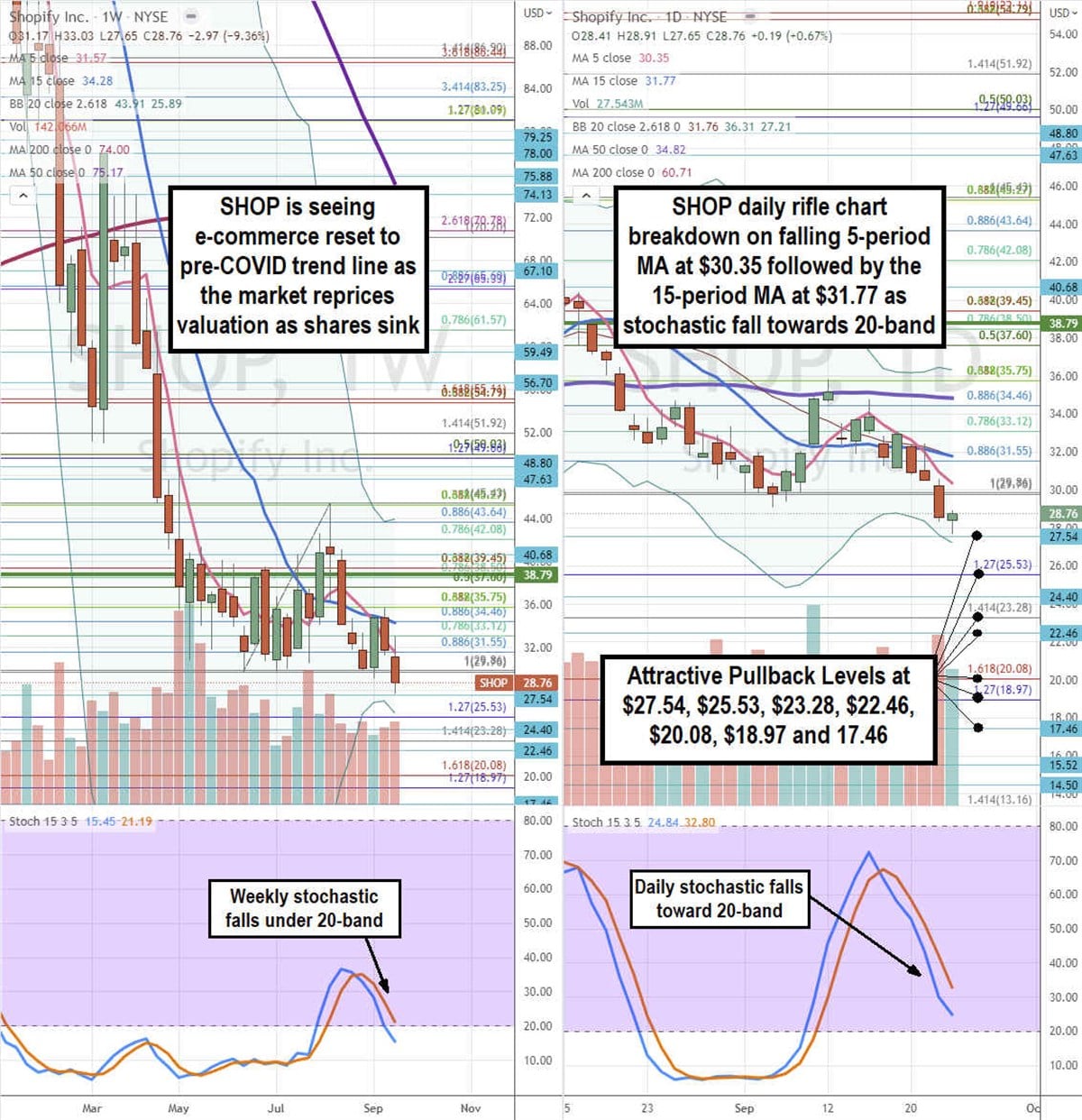Is the Market Overreacting with Shopify Stock? E-commerce infrastructure platform Shopify (NYSE: SHOP) stock has fallen from a high of $176.29 to the recent low of $27.65 in less than a year's time.
By Jea Yu
This story originally appeared on MarketBeat

- Shares may have been overly punished by the markets
- Shopify continues to grow, but at a slower pace
- Shopify says 2022 is the "transition back to normal year

E-commerce infrastructure platform Shopify (NYSE: SHOP) stock has fallen from a high of $176.29 to the recent low of $27.65 in less than a year's time. Shares are down a tear jerking (-79%) in 2022. The pandemic accelerated e-commerce adoption by a decade according to some estimates. Shopify operates in over 175 countries as an international e-commerce platform like Amazon (NASDAQ: AMZN) but more closer to eBay (NASDAQ: EBAY) and Etsy (NASDAQ: ETSY) comprised mostly of small businesses. This shot Shopify shares to the moon. Shopify empowers businesses to build professional-looking online storefronts complete with design, hosting, marketing, shipping, payments processing, and customer engagement tools on a one-stop shop. It also offers buy-now-pay-later options through its Shop Pay feature powered by Affirm (NASDAQ: AFRM). Unfortunately, the good times can't last at this super accelerated rate and sure enough, the reopening has caused growth to slow down, and its stock price followed. High inflation and rising interest rates are dampening consumer discretionary spending. This is especially problematic to Shopify as most of their merchants are small businesses paying a monthly subscription plan for access to the platform. These small businesses lack the capital to withstand a prolonged recession. While Shopify becomes an integral part of a small business, the business needs to sustain revenues to pay those fees. Growth has slowed down and profits have swung into losses. The Company has said that 2022 will be a one-off transition year where e-commerce will resume its pre-COVID trajectory of growth. The big question is whether the markets have overreacted with Shopify's stock as it often tends to overshoot on the upside and the downside.
Shopify Advantages for Merchants
While there are a lot of e-commerce and website builder platforms in the market, Shopify has managed to pull all the tools together in an easy to use one-stop shop platform accessible through the cloud, web, or mobile. For merchants, the differentiation is significant. They provide omnichannel store front capabilities to sell across web and mobile storefronts, social media, physical locations, and marketplaces. They enable business owners to manage their inventory, market and sell their products and grow their brands as Shopify handles the payments and shipping. It's merchant network also enables businesses to gain more traffic and eyeballs. It provides robust data for merchants to analyze and make better decisions. The platform enables businesses to offer its customers a complete end-to-end managed shopping experience at scale and a very reasonable price. The Company renewed its exclusive partnership with Affirm enable Shopify merchants to offer a buy-now-pay-later option offered through Shop Pay. Since June 21, 2021, Shop Pay installments powered by Affirm has enabled over 100,000 Shopify merchants to offer a buy over time solution. Qualified Shopify merchants can add Affirm's Adaptive Checkout to offer optimized payment options that can range from interest free bi-weekly payments to simple interest-bearing monthly payments seamlessly to customers.

Shopify Stock Here's What the Charts Say
Using the rifle charts on a weekly and daily time frame provides a precision view of the landscape for SHOP stock. The weekly rifle chart breakout attempt reversed at the $45.27 Fibonacci (fib) level. The weekly rifle chart formed another breakdown as the 5-period moving average (MA) at $31.57 falls through the 15-period MA at $34.28 towards the weekly lower Bollinger bands at $25.89. The weekly market structure low (MSL) buy triggers on a breakout through the $38.79. The daily rifle chart also broke down in similar fashion as the 5-period MA falls lower at $20.35 followed by the 15-period MA resistance at $31.77. The daily lower BBs sit at $27.21. The daily stochastic is oscillation lower as it nears the oversold 20-band. Attractive pullback levels sit at the $27.54, $25.53 fib, $23.28 fib, $22.46. $20.08 fib, $18.97 fib, and the $17.46 fib level.
Shopify Stock Growth Slowdown
Shopify reported its Q2 2022 earnings for the quarter ended June 2022 on July 27, 2022. The Company reported earnings-per-share (EPS) loss of (-$0.03) versus consensus analyst estimates for a profit of $0.03, missing by (-$0.06). Revenues grew 15.7% year-over-year (YoY) to $1.3 billion, missing the $1.33 billion consensus analyst estimates. Gross merchandise volume (GMV) grew 11% YoY to $46.9 billion. Merchant services revenues grew 18% YoY to $928.6 million.
President and CFO Comments
Shopify President Harvey Finkelstein commented, "Our incredible pace of innovation was highlighted this past quarter with Shopify Editions, a summary of 100+ new capabilities spanning B2B, POS Pro, Shopify Audiences and Shopify Markets, all designed to unlock even greater value across our entire platform and strengthen Shopify's commerce operating system." Shopify CFO Amy Shapero added, "While commerce through offline channels grew faster in Q2, where our exposure is lower but growing, we continued to see increased adoption of our solutions, enabling our merchants to remain agile against a challenging macro environment and highlighting the breadth and resilience of our business model" The big question is how well Shopify can weather a recession when its customer base is comprised mostly of those that are most sensitive to an economic downturn?









